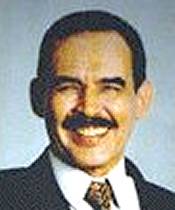| |||||||||||||||||
| |||||||||||||||||
| Turnout | 55.96% | ||||||||||||||||
|---|---|---|---|---|---|---|---|---|---|---|---|---|---|---|---|---|---|
| |||||||||||||||||
| |||||||||||||||||
Presidential elections were held in Mauritania on 7 November 2003. As expected, incumbent President Maaouya Ould Sid'Ahmed Taya was easily re-elected against weak opposition. The opposition alleged election fraud, and Taya's main challenger, former military ruler Mohamed Khouna Ould Haidalla (the man who Taya ousted when he seized power in December 1984), was arrested both immediately before and after the vote. [1] The elections saw two notable firsts; Aicha Bint Jeddane was the country's first female presidential candidate, and Messaoud Ould Boulkheir was the first descendant of slaves to run for the office. [2]

Mauritania is a country in Northwest Africa. It is the eleventh largest sovereign state in Africa and is bordered by the Atlantic Ocean to the west, Western Sahara to the north and northwest, Algeria to the northeast, Mali to the east and southeast, and Senegal to the southwest.

Maaouya Ould Sid'Ahmed Taya is a Mauritanian military officer who served as the president of Mauritania from 1984 to 2005. Having come to power through a military coup, he was ousted by a military coup himself in 2005. Prior to his presidency, he was the 5th Prime Minister of Mauritania.

Ret. Col. Mohamed Khouna Ould Haidallah was the head of state of Mauritania from 4 January 1980 to 12 December 1984. He was an unsuccessful candidate in the 2003 presidential election and the 2007 presidential election.
The elections took place a few months after a violent unsuccessful coup d'état attempt in June 2003, and Taya was overthrown in a coup two years later, in August 2005.

A coup d'état, also known as a putsch, a golpe, or simply as a coup, means the overthrow of an existing government; typically, this refers to an illegal, unconstitutional seizure of power by a dictator, the military, or a political faction.

The 2005 Mauritanian coup d'état took place on 3 August 2005. The long-serving dictator Maaouya Ould Sid'Ahmed Taya was ousted by the Armed Forces of Mauritania and replaced by the Military Council for Justice and Democracy, headed by Ely Ould Mohamed Vall, while Taya was in Saudi Arabia attending the funeral of King Fahd bin Abdul Aziz Al Saud. A constitutional referendum, parliamentary and presidential elections were scheduled and the coup leaders vowed not to contest any of the elections. The military government ended with the presidential election on 11 March 2007.




